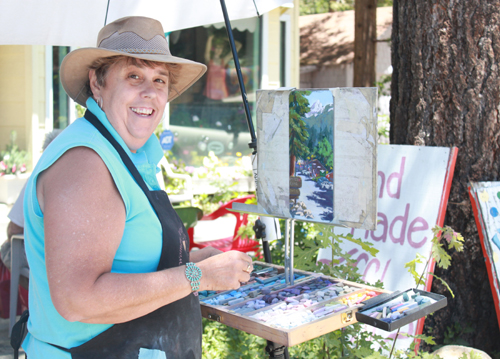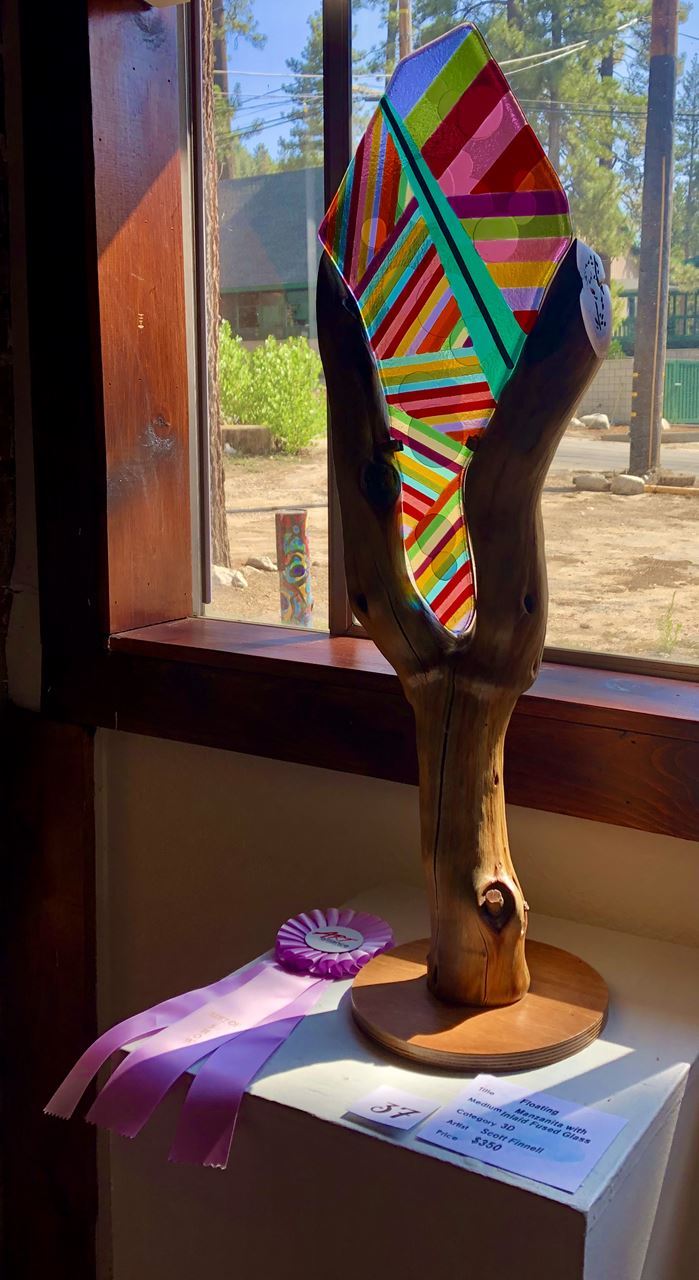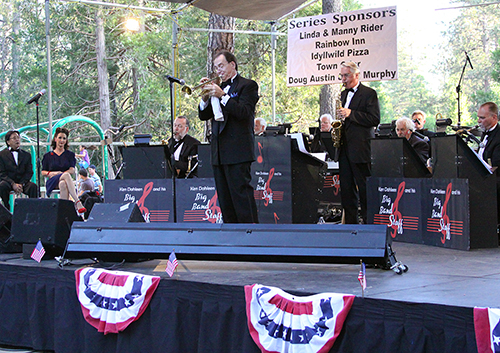This Thursday’s Idyllwild Arts Academy (IAA) Songwriting Concert, from 7:30 to 9 p.m., presents an excuse to mention an appointment that may have flown under the radar last fall: Kasaan Hammon’s promotion to assistant chair of IAA’s Music Department.

PHOTO COURTESY OF IAA
Hammon has brought “exceptional efficiency and problem-solving skills” as well as “warmth and humor” to her new role, according to Music Chair Heather Netz. Netz adds that Hammon’s “help has been indispensable and her energy seems tireless,” and her “expertise in songwriting and popular music production has been fortuitous in rounding out our leadership,” since Netz’s own training is classical.
Because the Music Department teaches classical music, jazz, and, in the Songwriting Program, every major genre of contemporary popular music, it is vital that “all our music students feel represented and understood,” Netz remarked. Hammon excels at giving the kind of attention that makes people feel represented, understood and valued. Idyllwild residents familiar with her volunteer efforts as a member of the Idyllwild School PTA and the School Site Council since 2015 and as leader of the music team at Idyllwild Community Church know this well.
The care Hammon gives people also is familiar to students like 2016 IAA graduate Miguel Soto. He talked at length about Hammon recently, just before his upcoming move from New York to Miami for the purpose of involving himself more intimately in the Latin music scene. Warner Chappell Music Mexico, a division of Warner Chappell Music, Latin America, has signed Soto as a songwriter, and he gives Hammon much of the credit for his musical development.
Soto recalls Hammon as “one of the Music Department’s most valuable teachers,” partly because she was “so committed to us” and “always available outside of class.” But Hammon also offered “criticism that was always direct and often tough, that always expressed what she really thought.” He sees Hammon’s directness as having “helped all of us in the Songwriting Program grow immensely” because “it’s important to know what a hard career you’re choosing if you want to be a professional musician — but also to be reminded that there are good career possibilities outside of becoming a famous pop star, which happens to very few of us.”
Told that her former student had appreciated her sometimes painful honesty, Hammon smiled.
“Yes, music is a hard and extremely competitive business. But I feel optimistic about our students’ prospects. As Miguel suggests, there are so many ways to succeed. One of the things that sets our Songwriting Program apart is that it’s geared to help students understand this. Our goal is to help students graduate with a clear idea of their unique set of talents and possible avenues into a career in music.”
Hammon is proud that the Songwriting Program gives its majors the option of a Music Technology concentration, with Michael Quick and Braden Diotte as teachers.
“We attract more and more students interested in music production because of the quality of our teachers and our growing number of offerings in music technology,” Hammon said. “But we don’t teach just the technical or production side of music. We also teach about music business. The business changes fast, but we educate our students in how to keep up with it. Part of that education comes from our master classes, for which we’re able to bring in top music executives. It doesn’t hurt that we’re close to Los Angeles. And meeting people like that gives our students a great head-start in networking.”
None of this means the Songwriting Program neglects the beating heart of the music industry — the music itself.
“Don Reed, Michael and I form the core of our Songwriting faculty,” she added. “Every song that our students present gets feedback from all three of us. That’s a tremendously broad range of perspectives because, collectively, we truly cover every type of contemporary popular music. Don’s area is Americana rock and country. He loves ’60s and ’70s rock and folk. Punk too, for that matter.
“Michael’s tastes are very different from that. They’re broad and eclectic, but I’d say he’s especially knowledgeable about experimental music, though he has a great ear for everything from alternative to mainstream. And I’m all about pop, including electronic dance music, R&B and even country.”
Hammon paused. “Maybe I shouldn’t talk too much about my own specialty,” she laughed. “But the topline curriculum that I teach goes into technical depth in a way that you won’t find in other places.”
Aware that non-musicians probably know nothing about topline, she explains that “Songwriting involves three main components. There’s the music, or accompaniment, meaning chords, beats, and instrumentation. There’s the melody, meaning the notes you sing, and the lyrics, or words. Most songwriters do a combination of these things, and some specialize in one or two. Topline writers specialize in writing melody and lyrics.
“For example, a music producer might have an exciting dance track with beats and lush instrumentation, but a good topline writer is needed to create the vocal melody and lyrics. If you start singing a song that you love out loud right now, you’re singing the topline.”
She paused again. “Anyway, that’s what I do. And Don and Michael are wonderful, so I’m sure they don’t really mind me talking about it.”
Hammon’s IAA history dates back to 1988, when she started as a sophomore Musical Theatre major. “That was only the third year that there was a high school and not just the Summer Program,” she recalls.
A campus production of “Little Shop of Horrors” in which she played a Doo-Wop Girl led to the creation of a girl group called Perfect Fifth. “We went on a California tour as far north as Berkeley. Marshall Hawkins went with us to play bass, and my big solo was the old hit by The Dixie Cups, ‘Going to the Chapel.’”
The range of Hammon’s performing talent was such that she graduated from IAA as a Dance major in 1990. Yet by the mid-‘90s, having studied at both Northwestern University and the California Institute of the Arts, she was living in Los Angeles, using RIGSI as her artist name and focusing on writing and recording the songs for her debut album, Gift of All.
“Then, in 1997, I was signed by a major label, Elektra. A number of my songs got radio and club play, and there was supposed to be an album. But because of changes at the record label, a full album was never released.”
Hammon put her frustration with Elektra behind her to move to New York for success in writing topline, which now occupies such an important place in the IAA Songwriting Program.
While writing topline, Hammon continued to compose her own songs. But, realizing she didn’t have a passion for being onstage and that she derived more satisfaction from composing and other kinds of behind-the-scenes work, she also went into management. She worked with talent in both New York and Philadelphia.
After returning to Los Angeles in 2005, she worked in Chaka Khan’s management team, and from 2008 to 2010 she managed Songwriters Hall of Fame member Albert Hammond.
It was through managing young artists and helping them build their careers that Hammon began to think about teaching. Back in Southern California, her 20-year reunion at IAA in 2010 led to a masterclass for the fledgling Songwriting Program, then to a series of masterclasses. She has taught regularly in the Songwriting Program since 2013.
Gradually, it became clear she had even more than her teaching excellence to contribute to the Music Department. Music is IAA’s biggest and most complex arts department, so the “exceptional efficiency and problem-solving skills” and other virtues Netz previously noted made her an irresistible choice to fill the need for an assistant chair.
With Hammon having given Netz all the help she was looking for, and more, Netz said, “We’re truly lucky to have her.” Of course, given the riches of the Music Department in general and the Songwriting Program in particular, it seems fair to say that Hammon is also lucky to have the role she does — and that the students are lucky to have such an education.







